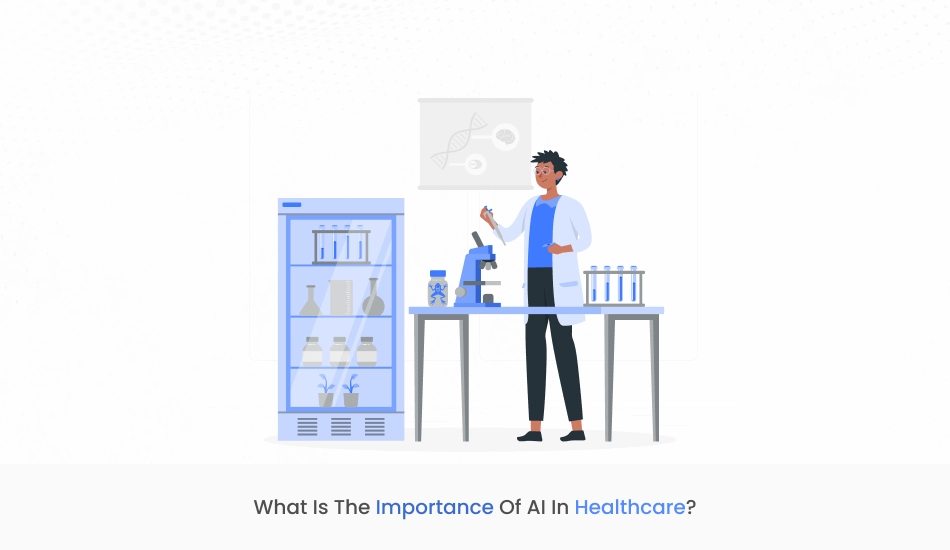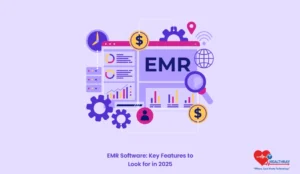Quick Summary
Artificial Intelligence has a major role in revolutionizing the entire healthcare industry through its lucrative functionalities, which are hard to implement in the traditional healthcare ecosystem. Adopting the hospital modernized concept enables hospitals to effectively allocate healthcare resources and contribute to achieving the hospital’s goals and objectives faster. Easy to provide healthcare facilities at each corner, regardless of their location and city situation.
Introduction
Artificial intelligence has immense extraordinary digital power which is impacting the overall Indian nation as it is not only beneficial for healthcare providers. Also, it changes the work concept for healthcare staff and increases their morale with a sense of job satisfaction. Healthcare departments such as laboratory management systems and pharmacy management systems have great opportunities to market themselves in the digital healthcare industry and earn side revenue.
It’s beneficial for creating more job opportunities and enhances the living standard of the people. Furthermore, this is a great path for the growth of the Indian economy. Now, We are creating the world of the Gen-Z generation who are used to gadgets or electronic devices and if we do not cope with this generation, hospitals lose their identity and decrease revenue income that will affect the entire hospital ecosystem. Also, decreases the contribution to the Indian economy.
While choosing the best healthcare software, it’s important to consider some vital factors such as Identifying the hospital’s needs and goals. Additionally, drafting the requirement in a sheet after discussing with the internal healthcare staff and their challenges in the traditional healthcare ecosystem. After that, scraping the top healthcare software list and picking the best one like Healhtray, and forgetting the rest. Hospital management systems help to train the healthcare staff and upgrade them to modern electronic devices.
Furthermore, Artificial Intelligence capabilities are vast, they are difficult to match with the traditional healthcare ecosystem. For upgrading your hospital and boosting your revenue. It’s necessary to collaborate with healthcare specialists and departments to expand services and change the whole concept of healthcare service. This is the vital step for understanding disease and its outcomes, enabling massive changes for better healthcare management and best healthcare practices.
Importance of AI in Healthcare Industry
Artificial Intelligence in healthcare helps in the development of medicine through continual patient monitoring, which is difficult in traditional healthcare. AI tackles many healthcare challenges with single healthcare software like Healthray, a comprehensive healthcare platform that has vast functionalities which focus on achieving the hospital goals and fulfillment of patient’s needs. However, it has many advantages such as :
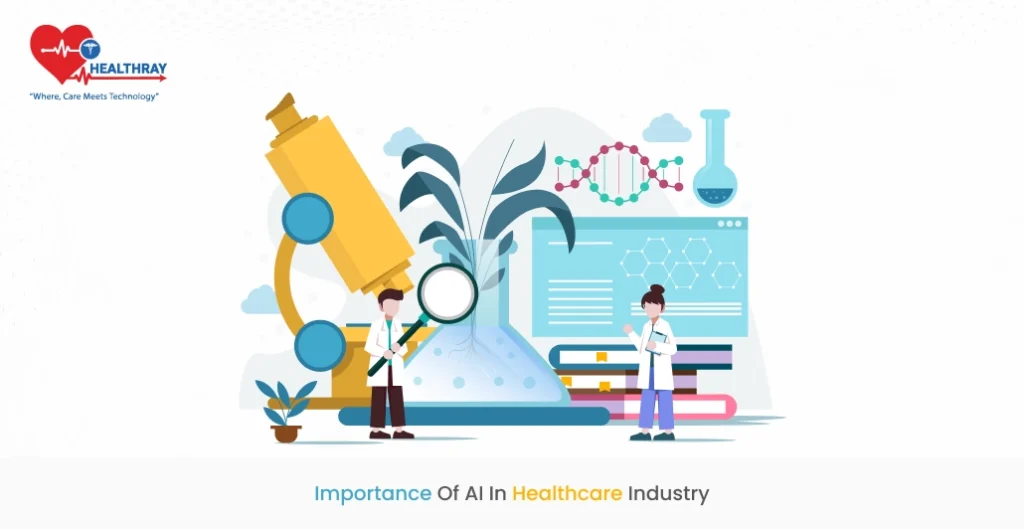
Effective Treatment :
Artificial Intelligence has vast capabilities that transform the healthcare process from complex to simplified. Provides best healthcare practices for different specialists such as cardiologists, neurologists, oncologists, ophthalmologists, and more. helps in analyzing reports through dashboards, which display whole healthcare information in one place in the visual format, ease understanding the reports, and derive meaningful conclusions out of it. Every specialist uses AI in healthcare in a different sense.
Dermatologists use hospital management software to capture medical images related to skin, hair, and nails and get treatment from home. Therefore, they can treat severe diseases related to the skin and hair such as eczema, psoriasis, acne, and more. Consequently, reduces the patient’s efforts and their huge transportation expenses, enhancing patient contentment and their digital healthcare experience. For cardiologists, it’s easy to understand the heart reports and analyze the cardiovascular system, which is difficult in the traditional healthcare ecosystem.
AI technologies not only transform the healthcare system. However, providing data-driven results and speedy patient recovery. Generally, It is believed that fast recovery is only possible when more money is spent on your healthcare but AI technologies ensure less expenses with the best patient quality care. Easy to comply with healthcare regulations in medical billing, prescription management, and medicine formulation. Thus, helps in the speedy treatment while ensuring the data security of patient information.
Boost Morale among Healthcare staff :
The incorporation of AI technologies supports building confidence and trust among patients. Not Limited only to the patients, but it extends boundaries to the healthcare staff. As it automates the whole hospital process from appointment scheduling to medical billing. Reduces the burden on hospital staff and increases their work capacity. Therefore, they can spend more time on patient care and accomplish the hospital’s goals. AI integration with HRMS (Human Resource Management System) software, which records each staff activity and maintains their performance records with verification documents.
With AI Technology, it’s easier to determine individual staff performance and persistently track their work, helping to determine appraisal amount and opportunity to integrate with digital technologies. Training empowers them to enhance their skills and builds job satisfaction while decreasing the job retention rate. Therefore, if they are satisfied, they will contribute more towards the hospital’s goals and objectives. Retaining old employees leads to more productivity as they have more experience in that particular hospital. Improving patient condition faster as staff are more focused on patient care.
After AI implementation, employees are more optimistic and they are likely to focus more on their work and avoid unnecessary operational work burdens and appraisal stress. As hospitals are moving towards Artificial Intelligence technologies, it enhances their revenue and increases job opportunities in the market and HRMS integration helps them to control the overstaffing and under-staffing situation. Thus, it maintains work-life balance which is more crucial in the modern landscape.
Adaptability :
In this evolving technological advancement, where changes are continuously taking place. Therefore, we require a comprehensive platform that is adaptable like Healthray. Furthermore, it is a one-time advancement, carefully making decisions while selecting hospital management software. Select only software that has adaptability attributes, and supports adapting to the changing healthcare ecosystems. As hospitals grow in terms of patients, healthcare specialists, and expanding services. Consequently, the software also grows with new features and other innovations.
Adaptability not only works in terms of systems and software. Also, it is included for hospital staff. After the implementation of hospital management software, the staff undergo a training process that makes them curious and enhances their innovative thinking. Consequently, helps them to widen their mind when the situation arises. It helps them to learn continuously and integrate with other healthcare departments. Also, They can take corrective decisions and precise actions.
Artificial Intelligence has the extreme power in which systems are also expanding their capabilities as situations arise such as changing healthcare regulations and medicine protocols. Consequently, support in adherence to entire medical sequence regulations in medical billing and properly maintaining prescriptions. Hard for hospitals to maintain persistent compliance with healthcare regulations as it is different for individual specialists.
Growth Advancement :
Artificial intelligence in healthcare supports advancing healthcare facilities and enhancing the growth of individual healthcare staff. This helps them to persistent learning as new technologies are arriving and healthcare software is expanding with different functionalities. Artificial intelligence automates clerical tasks such as scheduling appointments, maintaining patient data with their medical records, and having enough databases to record historical patient details.
Furthermore, supports adherence to healthcare regulations and maintains electronic records in an organized manner. Moreover, formulating healthcare analytics reports in an easy format that can be understood by any junior healthcare specialists and patients. After the implementation of AI technologies, junior specialists are also making corrective proactive decisions in the absence of doctors. Therefore, they can take emergency cases and might be saving patients’ lives.
Natural language processing helps in interacting with healthcare professionals and being able to share with them radiology images and medical reports. Therefore, it supports virtual health assistants and building different relationships such as doctor-patient, doctor-specialists, and one specialist- another specialist. Consequently, it builds income streams and opportunities to expand healthcare services without additional investment. Thus, supports enhancing the experience of healthcare staff and developing their skills with the advancement of healthcare technologies.
Strong Medical Networking :
Machine learning algorithms support the connectivity of different systems and maintain coordination among medical professionals. Building a strong network helps them earn extra revenue and maintain coordination for improving healthcare facilities for patients by expanding healthcare services. They can exchange their information and medical knowledge, which helps them maintain a professional relationship and free mentorship.
Furthermore, patients also collaborate with them on a single platform which maintains transparency. It increases their satisfaction and faith in medical providers. Consequently, enhancing patient engagement and support in speedy recovery of critical disease. Facilitate sharing feature and capturing radiology images, easy to understand complicated reports. Best AI technologies for sharing valuable information and providing guidance among healthcare specialists.
Deep learning algorithms can collaborate with different specialists and expand each other’s services that turn to access healthcare facilities to the corner of each city, town, and district. Enhancing medical knowledge assists them in handling emergency cases in the situation of a specialist’s unavailability. Ultimately, enhances the patient outcomes and turns their satisfaction to the next level.
Intangible Medical Images :
Integration of AI algorithms can record medical imaging in electronic format. Not only captures an image but also provides extendable features such as zooming in and out images, clear image format, and sharing with other healthcare specialists in the single platform. Also, this reduces hospital expenses and healthcare workload. Medical images including X-rays, CT scans, and MRIs are accessible to any specialists, patients, or any location. Easy to store in an organized manner and analyze easily. Consequently, taking proactive and timely decisions.
AI systems accumulate medical images and medical information including patient data with their historical and biographical information, which ease in making fast treatment decisions and improves patient care. The physical form of medical imaging has a cumbersome process that involves the development of the film from a combination of different chemicals namely sodium carbonate. After that, they fix the film and wash it to remove any residual chemicals. Lastly, film is dried which can be seen through flashing light.
The traditional method of radiology imaging is too time-consuming and increases the workload on healthcare staff. In contrast, electronic medical imaging is created through electronic sensors. Digital medical imaging has computerized images and can be set as per the specialist’s requirements. Clear image quality decreases the risk of chronic diseases and supports taking timely action. Therefore, it helps in drawing conclusions and faster patient treatment.
Better health outcomes :
Integrating AI in healthcare improves patient outcomes through computerized healthcare systems, which optimize administrative work and enhance resource efficiency through reducing healthcare workload. This supports recording patient transactions with medical history and patient’s sensitive information. All medical data information is protected through data integrity, supports protecting recording data from external threats, and maintains strict protocols. Therefore, It maintains confidential patient and hospital information with precise data information.
Through machine learning algorithms, ease scheduled appointments with a single click and receive timely reminders with alerts. In any conditions, appointments get re-scheduled or the doctor has been absent, the AI systems would send them a notification with a rescheduled timing calendar. Those prescriptions that are common can be stored in the databases and used when it’s necessary, it saves a doctor’s precious time and effort. Therefore, Machine learning systems assist in the elimination of paper-based record systems that conserve the environment’s resources.
Fostering healthcare collaborative platforms for healthcare providers and patients. Artificial intelligence platforms can support the sharing of medical documents and radiology images with different specialists, enhancing patient contentment and their experience. Patients are more relaxed and stress-free after adopting deep learning algorithms because it provides a comprehensive platform where it integrates with different healthcare departments such as pharmacy management systems and laboratory management systems. Therefore, ease of the patient’s work saves their time and they can focus on other important healthcare aspects.
Digital clinical practice :
Deep learning algorithms aid in understanding multi-language through natural language processing, which enhances healthcare facilities and extends services across regions. Improving accessibility and intuitive interface enhances patient satisfaction which increases the hospital’s revenue, which in turn increases healthcare Job opportunities. Ease in clinical documentation with drag-and-drop features and persistent compliance with healthcare regulations. Every specialist can customize their template to their needs.
Machine learning algorithms are an advanced technology that maintains health information data in an organized manner which helps in navigation easily. Also, persistent monitoring of disease supports fast patient recovery and achieving healthcare collaboration goals. Implementation of artificial Intelligence technologies helps in overcoming growing healthcare challenges, which are difficult to handle in the traditional healthcare system.
Furthermore, Artificial Intelligence optimizes clinical workflow by centralizing the whole healthcare record in a system, which helps in getting information whenever needed at any location. Ease in conducting administrative work tasks and reduces healthcare staff’s work burden. Compare the progressive reports with the earlier reports, enhancing effective treatment outcomes and speedy recovery of critical diseases that need persistent monitoring.
Reduces Healthcare Costs :
Incorporation of deep learning algorithms to save healthcare expenses is the ultimate goal of healthcare organizations, which leads to increasing expenditure on other crucial healthcare activities. Machine learning allows us to record, visualize, and analyze medical documents. Therefore, AI technologies record medical documents with radiology images. After that, visualizing medical documents with zoom in and out features for better understanding and analyzing effectively.
Deep learning algorithms provide support to different medical practices such as medicine development and their discovery after in-depth analysis reports through comprehensive dashboards with visual elements. Medical imaging cuts down the expenses that are incurred in producing films and reduces labor work. Therefore, they are focusing more on improved patient care and handling their queries with more patience.
Furthermore, AI technologies convert whole paper records into digital format, which makes it easy to share and collaborate with other healthcare specialists for fast patient treatment that reduces healthcare efforts and focuses their time on earning extra income by doing a normal course of healthcare activities remotely such as providing healthcare assistance and medical advice on particular cases. Consequently, it requires less healthcare staff to conduct operational work and reduces recruitment costs. Also, decreases the additional costing which incurred on producing physical documents and their maintenance.
Expanding Healthcare services :
Machine learning algorithms in healthcare strengthened relationships among healthcare providers and patients. It aids in overcoming hurdles of miscommunication among healthcare professionals because it maintains transparency and fosters clear image quality with accurate documents. It builds confidence and faith among healthcare professionals. Therefore, they are willing to expand their healthcare services by collaborating with diverse healthcare specialists and upholding the opportunity to increase hospital revenue.
Deep learning algorithms support the analysis of healthcare data which is difficult in traditional healthcare by incorporating novel technologies, which are depicted in a visual format that can be understood by patients and other junior healthcare professionals. Artificial Intelligence undertakes substantial integration projects for integrating different healthcare systems at a single platform such as laboratory management systems, pharmacy management systems, and electronic health records. Consequently, patients are more convenient with healthcare platforms because entire medical facilities are provided in a single platform. Thus, it improves patient outcomes and their engagement in hospitals.
Through AI systems, it’s possible to access healthcare services in towns, cities, and villages and improve the living standards of people. This is more useful for remote areas where entire healthcare facilities are difficult and diagnosing critical diseases seems more difficult. Artificial intelligence technologies are more relieving for disabled patients, who have difficulty traveling. Also, enhances patient safety by incorporating AI technologies that protect patients’ sensitive information.
Role of Artificial Intelligence in Healthcare Evolution
Nowadays, people are more health-centric and it’s more important to cope with the dynamic culture and adapt modernization concepts including Artificial Intelligence integration in healthcare. This concept changes the way to perceive healthcare facilities and a tremendous shift in the healthcare ecosystem, impacting healthcare staff to the pharmaceuticals. AI technology allows everyone to receive healthcare facilities anywhere at any time through one single click. Let’s discuss the role of Artificial Intelligence in healthcare and understand how it impacts in the modern technologies :
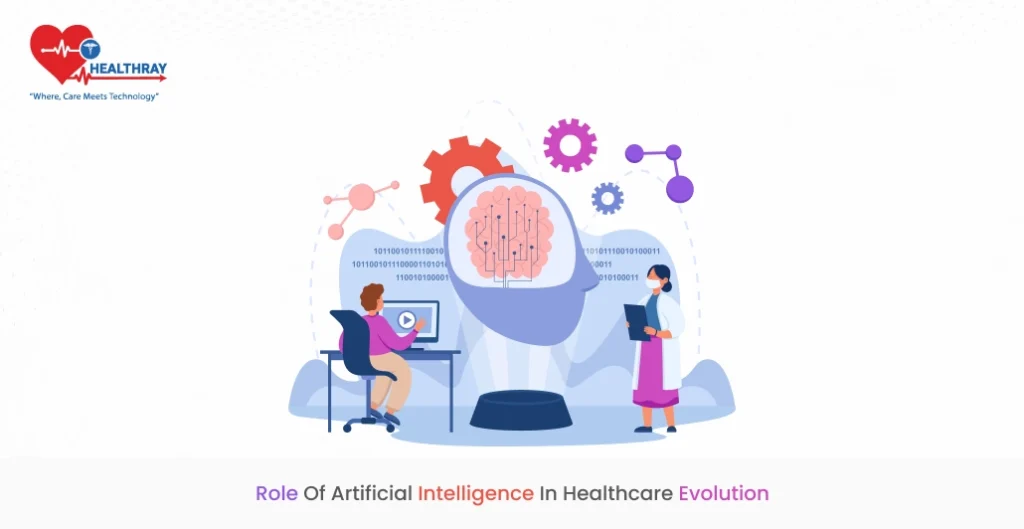
Digital Healthcare Assistant :
Machine learning algorithms support persistent health monitoring which can detect chronic diseases such as heart attack, skin cancer, diabetes, and more. Receiving scheduling reminders and alerts regarding wrong dosages and canceled appointments. Also, providing effective treatment through in-depth health monitoring and easily determined critical areas where more specialization is required. Consequently, communicate with healthcare experts on the same platform and be able to share electronic radiology images.
After Artificial Intelligence implementation, it is easy to develop medicine after careful analysis of healthcare reports and fostering comprehensive health data with visual elements in a single dashboard, which are easy to understand and draw effective treatment decisions. Medical providers can treat patients from any location and handle them virtually. They can earn extra revenue without additional investment and maintain adequate amounts of healthcare resources.
With the help of an AI system, patients can chat with doctors and other healthcare experts at any time. They have access to their medical data and demographic information with vital signs. Also, Viewing their health records in an organized medical report which is easy to interpret. Therefore, they can increase their capacity to think and can take health-centric situations without delving into the wrong direction.
Inventory Optimization :
Artificial intelligence systems maintain optimum levels of inventory, reducing the situation of over-inventory and under-inventory. This situation arises when there is mismanagement in warehousing and difficulty in prediction for future stocks. Consequently, order in bulk or no order of necessary medical equipment. Both conditions are worse, incurring unnecessary expense and accumulation of expired medicines and broken equipment, leading to more wastage and accumulation of obsolete equipment.
Step towards digital era with our healthcare solution
Revamp your hospital facilities and embrace change for better healthcare management. Ease in managing and organizing large medical datasets leads to effective analysis. Seize the opportunity now!
Furthermore, there is an implementation of a deep learning algorithm to tackle over-inventory and under-inventory situations. AI systems have distinct functionalities that support optimization of inventory levels including tracking equipment which calculates maintenance time with their purchasing time and track equipment location. Facilitate a centralization platform of inventory where that shows all inventories in a single dashboard with customizable features in which individuals can enter additional entries as per their requirements.
Machine learning algorithms can maintain healthier relationships between vendors and hospitals by maintaining electronic inventory records. This information included the purchasing date, expiry time, maintenance date, and replacement time. AI systems send alerts when there is a time of maintenance, expiry, and replacement. Consequently, inventories are always in optimal condition and decrease the risk of legal action.
Simplify Administrative Work :
Deep learning allows us to work in an automated mode which eradicates the paper-based system and reduces unnecessary medical expenses, enhancing the capacity of healthcare workers and reducing operational workload. Therefore, it enhances work satisfaction in healthcare staff that turns to focus on other vital aspects and they also can contribute towards healthcare goals. Optimization of clinical workflows supports simplification of operational work from scheduling appointments, reminders, and getting alerts whenever required.
Healthcare providers do not need to waste their time on unnecessary activities which require lots of time and effort. Now, the work is set on electronic devices and can be done without undergoing any complex procedure. Eliminates human error and fast insurance verification with the claim reimbursement process. Whole hospital data is recorded into the computerized system with confidential patient information. Therefore, it doesn’t require more staff resources to complete the documentation process and saves more time and patient effort.
Not only do healthcare providers get the benefit, but it is also beneficial for patients, outside vendors, and outsourcing services. Further, this supports a fast claim reimbursement process and reduces patients’ transportation costs which saves tons of time. Improving tracking of resources such as medical equipment, medicines, and more. Consequently, maintains better relationships with vendors and healthcare specialists. Also, reduces the risk of future conflict and enhances hospital efficiency.
M-health :
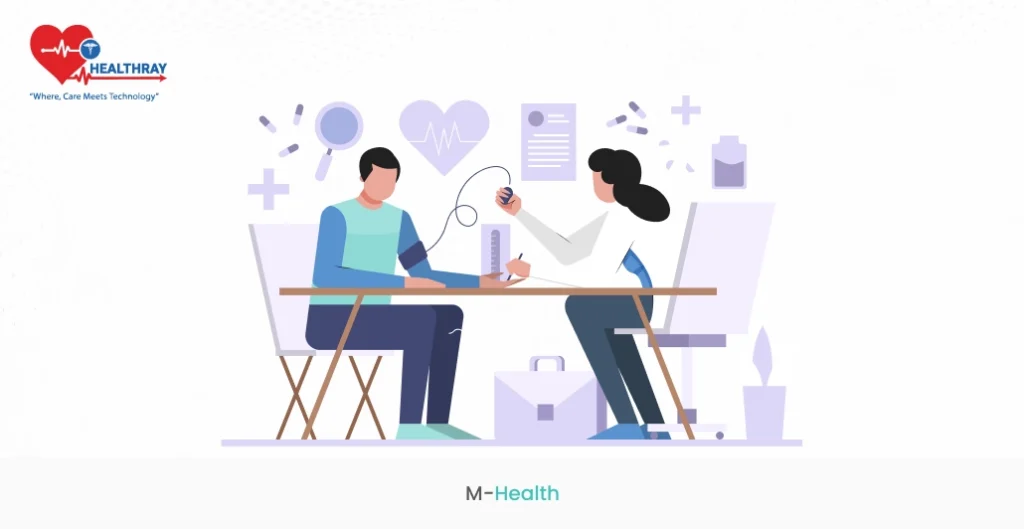
AI in healthcare supports virtual consultation in which healthcare providers can treat patients anywhere from any geo-location. Helps in maintaining chronic diseases with persistent monitoring and is a great option for widened healthcare delivery. Ease in taking healthcare facilities and getting effective treatment in those areas where it’s difficult to get medical care. Healthcare providers can write prescriptions from any digital device such as a laptop, mobile, or iPad.
Healthcare providers and patients can send medical reports to any other medical specialists with just a few clicks. Also, ensures patient safety and maintains transparency. Mobile health improves medical accessibility by reducing healthcare expenses. Hospital Management systems in healthcare facilitate mobility so that the user can carry the device anywhere at his preferred location, and maintain a healthier lifestyle from their home. Minimizing healthcare expenses for extra revenue income. Consequently, healthcare specialists can set up their digital clinics without any additional investment.
AI in healthcare promotes coordination with other healthcare experts and helps in effective decision-making regarding treatment and medicines. Ease in taking medical advice and enhance medical information. Also, it provides opportunities for research in health-related data and sharing billing information to the accountant department or other departments at any time. Therefore, assists in handling cases in emergency and access healthcare delivery to underserved areas.
Precise health Prescription :
Integrating AI aids in accurate prescription with compliance with healthcare regulations. This platform provides entire patient medical information with their medical history and vital signs, which are essentials for writing prescriptions. Prescription format with adherence to medical regulations helps in achieving patient satisfaction and reducing court cases or any legal notice. There are lots of ready-made templates available in the digital healthcare platform. Also, it can be customized as per the patient’s condition and healthcare provider prerequisites.
AI in healthcare fosters accurate diagnosis by providing comprehensive patient information with radiology images and a major role in precise prescription. The prescription includes key components such as basic patient details, prescription date, displaying detailed medicine information such as no of doses, medicine name, and any instructions. Also, providing detailed signatures of healthcare providers is necessary for the credibility of healthcare professionals.
AI systems accomplish in achieving healthcare goals which include precise documents with correct medication dosage. Also, get notification alerts in case of incorrect medicine dosage. Digital prescription reduces manual error and duplication of healthcare efforts with correct instructions, enhancing patient safety and a high level of satisfaction towards healthcare organizations.
Health Tracking :
AI in healthcare supports tracking critical diseases, healthcare performance, and medical equipment. Furthermore, several diseases require continuous monitoring and are also required to track their medication doses. Patient medical information with their medical history assists in precise tracking of their health and progression reports. Radiology images are recorded in digital format which helps to analyze the reports early and be able to send reports to any other healthcare experts for precise treatment.
This platform sends reminders for medicines and also provides an entire medicine dose report that includes medicine time. Patients tick in the digital device after taking medicine and it assists in accurate health monitoring. Creates healthcare awareness for patients so they can be health conscious and take proactive steps for better health management. Therefore, it improves citizens’ health and turns to increasing the production capacity and stamina of an individual.
Health tracking contributes to achieving healthcare goals and motivates individuals to focus on their health. Individuals can track their health and maintain a healthy lifestyle, which enhances confidence among them and can detect any abnormal condition. Furthermore, Detecting chronic conditions after careful examination of healthcare reports. Facilitate inventory tracking which includes several components such as order details, maintenance time, and replacement time. Also, the entire vendor information for the credibility of an individual.
Conclusion
Artificial Intelligence in healthcare is transforming the concept of the medical industry, enticing individuals to participate in their health and get numerous benefits that are beyond the level of the traditional medical industry. Facilitate whole medical information from patient information to inventory management. Automated whole healthcare tasks from appointment scheduling to medical billing. Whole hospital transactions are recorded in the computerized system whether it is billing or health related. Optimize clinical workflow and reduce administrative workload.
Consequently, they can spend the most time on patient care.
AI in healthcare improves healthcare departmental collaboration and coordination among them. Therefore, enhances patient safety and builds their faith in healthcare organizations. Also, motivates them to be a part of the digital healthcare ecosystem. Healthcare departments can send reports to other specialists. Also, they can earn extra revenue through referrals and virtual consultations. Artificial Intelligence captures radiology images such as MRI, CT scans, and X-rays, effectively diagnosing chronic diseases and providing personalized patient care.
